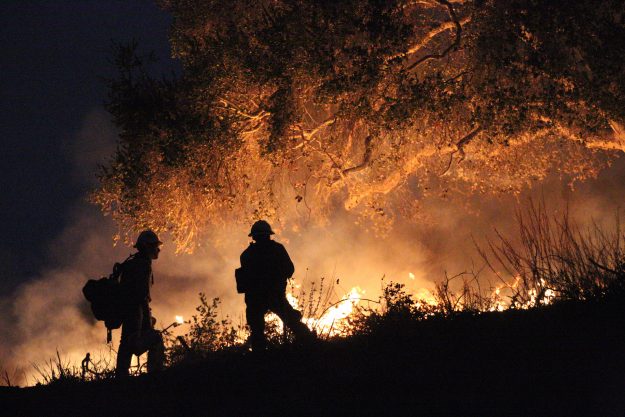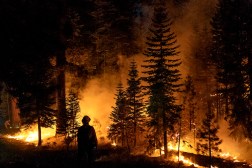Verizon throttled service for California firefighters responding to largest blaze in state’s history

Earlier this summer, as part of the response to what’s become the biggest wildfire in California’s history, firefighters from Santa Clara County found themselves cut off from the internet in the field as they tried to relay the latest data from the inferno back to headquarters and other agencies.
A Verizon account linked to a mobile router the department uses in the field hit its monthly data limit, resulting in the wireless provider to sharply limit, or “throttle,” the router’s upload and download speeds for the remainder of the billing period.
“Dated or stale information regarding the availability or need for resources can slow response times and render them far less effective,” Anthony Bowden, the chief of the Santa Clara County Central Fire Protection District, said in a declaration attached to a federal lawsuit pitting 22 states and the District of Columbia against the Federal Communications Commission.
The states are suing the FCC over its decision to overturn a 2015 rule establishing net neutrality, which prohibited internet service providers from prioritizing the transmission of certain types of content over others. Bowden’s declaration was first reported Tuesday by Ars Technica .
“Resources could be deployed to the wrong fire, the wrong part of a fire, or fail to be deployed at all. Even small delays in response translate into devastating effects, including loss of property, and, in some cases, loss of life,” Bowden continued.
According to Bowden’s declaration, his department had deployed resources to northern California to help combat what’s now called the Mendocino Complex Fire, including a command-and-control vehicle referred to as “OES 5262.” The equipment aboard that vehicle, Bowden said, is capable of organizing and routing firefighting resources to the sites where they’re most needed.
One of the devices aboard OES 5262, Bowden said, is a mobile router that transmits between five and 10 gigabytes of data in a typical day in the field. Santa Clara firefighters, he explained, use cloud-based software to conduct “near-real-time resource tracking” that covers not only the department’s own personnel and equipment, but that of other agencies responding to the fire, including other local governments from around California, the Defense Department, the Bureau of Land Management and the U.S. Forest Service.
But in the middle of the Santa Clara team’s response to the Mendocino Complex Fire, which has now burned more than 410,000 acres, OES 5262’s download and upload speeds plummeted. Bowden says that the department’s usual download rate of 50 megabits per second had dropped to one-two-hundredth its normal speed. According to an email exchange the fire chief attached to his statement, when the fire department’s staff relayed the news to Verizon, the wireless company initially responded by offering to sell firefighters a more expensive data plan.
In a June 29 email to a Verizon sales representative, Santa Clara Fire Capt. Justin Stockman wrote that the throttling of OES 5262’s data speeds meant that “the [router] that can normally act like a modern broadband internet connection is slowed to the point of acting more like an AOL dial up modem from 1995.” The sales representative wrote back, explaining that the fire department was subscribed to a plan that technically offers “unlimited” data, but greatly decreases speeds after 25 gigabytes have been transferred in a given billing cycle.
At first, the Verizon employee offered to move the department from its previous plan that cost $37.99 per month to one costing $39.99 per month. That $2 difference would’ve bought the fire department the same 25 gigabyte limit at normal speeds, and a slightly faster — though still vastly reduced — transfer rate once the initial data load was reached. A month later, with no change in service, Stockman wrote Verizon again that the fire department’s connection was still being throttled. The router inside OES 5262 was showing download speeds of 0.2 megabytes per second and uploads of 0.6 megabytes per second, Stockman wrote, “meaning it has no meaningful functionality.”
Santa Clara Fire’s acting information technology officer, Daniel Farrelly, pleaded with Verizon for a plan that did not result in automatic throttling once a certain data limit had been crossed. “Please work with us,” Farrelly wrote in a July 30 email. “All we need is a plan that does not offer throttling or caps of any kind.”
In a statement released Tuesday , Verizon admitted it bungled its response to the Santa Clara County firefighters, but that the issue is not related to net neutrality.
“This situation has nothing to do with net neutrality or the current proceeding in court,” the statement reads. “We made a mistake in how we communicated with our customer about the terms of its plan. This customer purchased a government contract plan for a high-speed wireless data allotment at a set monthly cost. Under this plan, users get an unlimited amount of data but speeds are reduced when they exceed their allotment until the next billing cycle. Regardless of the plan emergency responders choose, we have a practice to remove data speed restrictions when contacted in emergency situations.”
The rules the FCC implemented in 2015 blocked internet service providers from favoring content from certain providers, but did not prohibit them from implementing caps on overall data usage in contracts with their users.
Ultimately, the Santa Clara County fire department changed plans. The change came after a period when its personnel had to use their mobile phones, as well as other agencies’ equipment, Bowden said in his declaration. “While Verizon ultimately did lift the throttling, it was only after County Fire subscribed to a new, more expensive plan,” Bowden said.
According to one of the emails between Santa Clara and Verizon, the phone company offered a plan providing 20 gigabytes of data per month for $99.99, plus $8 for every additional gigabyte without any drop in speed.






